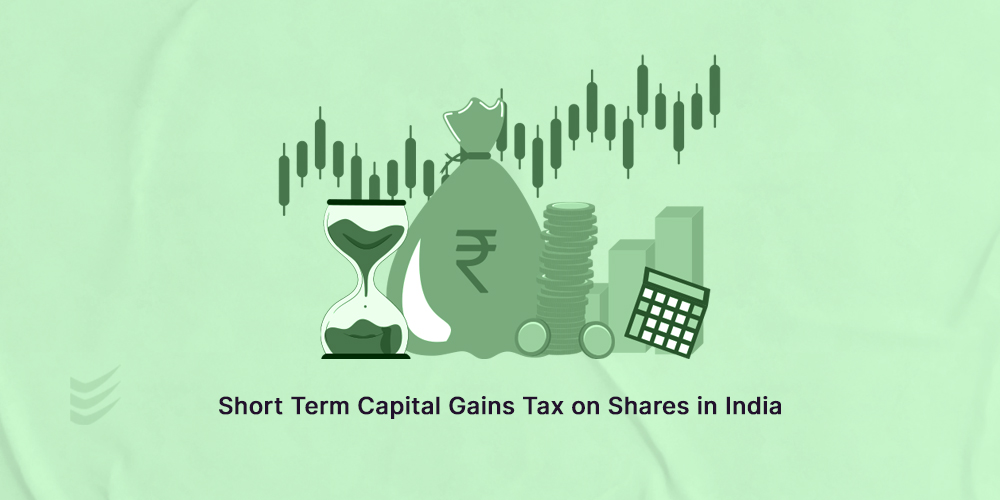Understanding Short Term Capital Gain Tax on Shares in India

Taxation is an important obligation imposed by the government on its residents which needs to be paid by the resident for the return on his investment.
Short Term Capital Gain on Shares is the capital gain on financial securities that has a holding period of less than 12 months.
Understanding Short Term Capital Gain Tax STCG Shares in 2025
December 2024: Major Tax Amendments
STCG Tax Rate Hike: From the effective date of July 23, 2024, the Union Budget 2024 has made a major shift in the taxation of short-term capital gains. The rate of tax on short-term capital gains on listed equity shares and equity-oriented mutual funds was increased to 20% from 15%. This has been done with the aim of promoting long-term investment as short-term trading becomes less profitable for the investor.
LTCG Exemption Limit Hiked: In addition to the STCG tax increase, the budget also hiked the exemption limit of Long-Term Capital Gains (LTCG) on listed shares and equity schemes from Rs.1 lakh to Rs.1.25 lakh annually, encouraging long-term investments further.
January 2025: Market Reactions
Investor Adjustments: Institutional and retail investors adjusted by going back to their short-term trading strategies, with some scaling down speculative trading because of the increased tax cost.
Emphasis on Tax-Efficient Strategies: Most advisors started advising holding stocks for more than a year to benefit from the lower LTCG tax rate of 12.5%, particularly for high-value investments.
February 2025: Continued Discussions
Government Contemplations and Market Impact: There was public discourse among the finance community concerning market liquidity repercussions that the enhanced rate of taxation for STCG might have on speculation trades.
Government Contemplations and Market Impact: There was public discourse among the finance community concerning market liquidity repercussions that the enhanced rate of taxation for STCG might have on speculation trades.
Short Term Capital Gain Tax on Shares
Short Term Capital Gain Tax on Shares is the tax levied on financial instruments like exchange traded funds (ETF), government securities (G-Secs), UTI funds, equity mutual funds units , shares traded on stock exchanges and zero-coupon bonds.
Short Term Capital Gain Tax On Shares is a tax levied on the return earned from the shares under Securities Transaction Tax (STT), Section 111 A of Income Tax Act.
List Of Financial Instruments Listed Under Section 111 A Of Income Tax Act
-
Equity shares listed on recognized Indian Stock Exchanges.
-
Units of Equity oriented mutual funds of Indian companies.
-
Units of business trust listed on recognized Indian Stock Exchanges.
The above listed securities are taxed at 15% (including applicable surcharge and cess) if the tax is paid on the transactions.
If the tax is not paid on during the transactions, then the tax would be levied at the individual’s applicable tax slab.
List Of Financial Instruments That Are Not Listed Under Section 111 A Of Income Tax Act
-
Debt Mutual funds
-
Non- equity shares like preference shares or shares of private company
-
Debenture instruments like bonds, debentures and government securities.
-
Real Estate
-
Physical gold and other commodities .
The above listed financial instruments when held for a period less than three years are taxed based on the individual's tax slab rate.
Short Term Capital Gain Tax Calculation
Short Term capital gain tax is applicable to the capital gain on a transaction and not on the sales proceeds. If the selling price exceeds the buying price of the share , the difference is the capital gain from share transfer. Similarly, if the buying price exceeds the selling price of the share, the difference is the capital loss from the share transfer.
Short Term Capital gain = Selling Price – (Buying price + Expenses)
Step wise Short Term Capital Gain Calculation
-
Calculate the buying price of the share
Buying price is the price at which the share was bought. Sometimes , the shares would be bought multiple times within a short term, in such case , calculate the average buying price .
-
Identify the selling price of the share
-
Include Expenses incurred
The expenses may be incurred by buying or selling of the share like brokerage fees, commissions, or any stamp duty.
-
Subtract buying price and expenses with selling price of the share.
By this calculation, the actual short term capital gain of the share can be obtained.
-
Calculate the short-term capital gain tax on shares as per the income tax slab rate.
Short Term Capital Gain on Shares Calculation Depiction
|
Selling Price of Share |
|
Less : Expenses incurred during Purchase of share |
|
Less : Expenses incurred during Sale of share |
|
Balance : Short Term Capital Gain on Shares |
Sample Calculation on Short Term Capital Gain on Tax
|
Buying Price Per Share |
Rs.100 |
|
Number of Shares |
100 |
|
Buying price of 100 shares |
Rs.10000 |
|
Expenses Incurred during purchase and sale of shares |
Rs.1000 |
|
Selling Price of 100 shares |
Rs.12000 |
|
Short Term Capital Gain Stocks |
Rs.1000 |
Short Term Capital Gain Tax Exemptions
-
Short Term Capital Gain Tax on shares is exempted and not taxed when a share listed on the stock exchange is transferred in the International Financial Service Center (IFSC)
-
Also, short term capital gain tax on shares is not taxed on Foreign Institutional Investors (FII) as these shares are considered as capital assets.
-
In general, the shares traded on stock exchanges are not exempted from any exemptions under Section 111A of Income Tax Act. But few criteria make resident individuals exempted from tax based on income levels. They are
-
For age eighty years or more and with an annual income of or below Rs. 5 Lakhs.
-
For age in between sixty years to eighty years with an annual income of or below Rs. 3 Lakhs.
-
For age below sixty years and with an annual income of or below Rs. 2.5 Lakhs.
-
Hindu Undivided Families(HUF) with an annual income of or below Rs. 2.5 Lakhs.
-
Short term Capital gain tax on shares under Section 111 A of Income Tax Act exempts only resident Indian individuals and resident HUF to claim the exemption limit.
-
These short-term capital gain tax on shares exemption can be availed only after adjusting other income of the individuals.
-
For non-resident individuals, irrespective of age and with annual income less than Rs.2.5 Lakhs can claim tax exemptions.
Short Term Capital Gain Tax on Shares Deductions
-
In the view of Section 111A of Income Tax Act, individuals cannot avail any deduction on short term tax on shares under Section 80C.
-
Individuals can claim deductions on tax on STCG on shares which are not included under Section 111A of Income Tax Act.
Strategies to Reduce the Tax Burden on Short Term Capital Gain on Shares
Individuals can follow certain strategies to reduce his tax burden on short term capital gain on shares.
Offset capital losses against capital profit
It is the process in which the individuals can offset the loss incurred in short term capital against the profit incurred in the long-term capital gain in order to adjust his tax. While offset cannot be considered as a strategy, it can be used to reduce the tax liability .
Offset current capital losses against future capital profit
An individual can offset the loss incurred in short-term capital against the profit incurred in long term capital in the immediate financial year. This strategy can act as a valuable tool to reduce tax liability. Also, this strategy can be applied to profits incurred by the individual in the succeeding eight financial years.
Equity Linked Savings Scheme
ELSS is a type of tax saving mutual fund scheme which offers tax benefits under Section 80C of Income Tax Act .The short-term profits gained from ELSS scheme are eligible for tax deduction for up to Rs.1.5 lakhs in a financial year. These ELSS mutual funds invest the funds in equities that provide higher returns than other tax saving schemes like Public Provident Fund and National Savings Certificate.
Holding Period
As of Indian Income Tax laws, the tax slab rate for short term capital gains is higher than the tax slab rate for long term capital gains.
For equity instruments, with holding period more than one year and capital gain exceeding Rs.1 lakh are considered as long-term capital gain and the tax rate applicable is 10%.
For equity instruments, with holding period one year are considered as short-term capital gain and tax rate applicable is 15%.
Thus, the investments when held for more than one year have less tax slab rate and help to reduce the tax liability of the individual when the individual has invested in equities or equity mutual funds.
Short Term Capital Gain Tax on Shares in FY 2023-24
|
Financial Instrument |
Holding Period |
Tax % |
Notes |
|
Equity Shares & Equity Mutual Funds |
Less than 12 months |
15% |
Applies to listed and unlisted shares. |
|
Debt Mutual Funds |
Less than 36 months (current changes) |
Applicable as per Individual income slab rate |
Currently, updated as short-term capital gain. |
|
Business Trust Units |
Less than 12 months |
15% |
- |
|
Gold ETFs |
Less than 36 months |
15% |
Short-term gains taxed at 15%, long-term gains at 20% with indexation benefit. |
Conclusion
Short Term Capital Gain on shares are capital gain from the shares that are sold within a period of one year from purchase. These short-term capital gain tax on shares can be paid either under Section 111A of Income Tax Act or as per individual income tax applicable tax slab rate. When considering STCG on shares tax rates, the tax rates are higher for short term capital gain than on long term capital gain on shares . The government has kept the tax higher in order to discourage investors from selling the share within a period of one year. Thus, long-term capital gain is more beneficial to individuals than short term capital gain.
Investors can avail the benefit of the best trading app India for beginners by Enrich Money which helps investors to plan their investments to minimize their taxes.
Frequently Asked Questions
What Is The Difference Between Long Term Capital Gain And Short-Term Capital Gain On Shares?
Long-term capital gains (LTCG) on shares are profits made from selling shares held for more than 12 months, taxed at 10% without indexation benefit if the gains exceed Rs. 1 lakh. Short-term capital gains (STCG) are profits from selling shares held for 12 months or less, taxed at 15%. The tax rates for LTCG and STCG differ, with LTCG taxed at a lower rate to incentivize long-term investments. Holding shares for longer periods can result in lower tax liabilities due to the favourable tax treatment of LTCG.
What Is The Tax-Free Limit For Short Term Capital Gain On Shares?
In India, the tax-free limit for short-term capital gains on shares is nil. All short-term capital gains from the sale of shares are subject to a flat tax rate of 15% under the Income Tax Act, 1961. This tax is applicable if the shares are held for less than 12 months. Long-term capital gains, on the other hand, are tax-free up to Rs. 1 lakh, and any gains above that are taxed at 10% without indexation benefit.
How to prevent taxation on short term capital gain on shares?
To prevent taxation on short-term capital gains on shares, consider the following strategies:
-
Offset gains with short-term capital losses from other investments.
-
Invest in tax-saving instruments like ELSS mutual funds or PPF.
-
Opt for the benefit of double indexation if applicable.
-
Utilize the benefit of deductions under Section 80C, if eligible.
-
Plan your investments to stay within the tax-free limit of Rs. 1 lakh for long-term gains.
What is the relationship between Section 111A and short-term capital gain Tax on shares?
Section 111A of the Income Tax Act, 1961, provides a special tax rate of 15% on short-term capital gains from the sale of equity shares or units of equity-oriented mutual funds, where the Securities Transaction Tax (STT) has been paid. This section applies to transactions where shares are held for less than 12 months. The benefit of the lower tax rate under Section 111A is available to both residents and non-residents.
How a wealth management firm like Enrich Money helps investors in short term capital gain tax on shares management?
Enrich Money helps investors in managing short-term capital gain tax in the following ways:
-
Tax Planning: Providing guidance on tax-efficient trading strategies to minimize short-term capital gains tax liability.
-
Record-Keeping: Maintaining detailed records of transactions to accurately calculate and report short-term capital gains for tax purposes.
-
Tax Reporting: Assisting in the preparation and filing of tax returns, ensuring compliance with relevant tax laws.
-
Investment Advice: Offering advice on investment decisions to optimize returns while considering the tax implications.
-
Education: Educating clients about tax-saving investment options and strategies to reduce short-term capital gains tax burden.
Related Stocks:
Disclaimer: This blog is dedicated exclusively for educational purposes. Please note that the securities and investments mentioned here are provided for informative purposes only and should not be construed as recommendations. Kindly ensure thorough research prior to making any investment decisions. Participation in the securities market carries inherent risks, and it's important to carefully review all associated documents before committing to investments. Please be aware that the attainment of investment objectives is not guaranteed. It's important to note that the past performance of securities and instruments does not reliably predict future performance.



